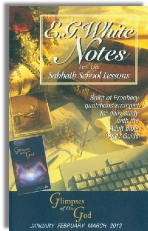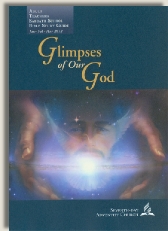|
||||||||||||||
Commentary on "The God of Grace and Judgment"
Day 2: Sunday, January 22, 2012 - Judgment Day
Overview
Again there is much to applaud in this lesson. The lesson clearly establishes that judgment is a reality. However, this lesson also displays the SDA indoctrination and the misinformation that the SDA church feeds its members about other churches. The lesson states:
"And contrary to common beliefs, judgment is not contrary to salvation or to the gospel."
This lesson is trying to reinforce to SDAs that they are the only church that is really following the Bible. As we have seen many times in these lesson reviews, the SDA church falls way short in actually following the Bible-you can look ahead to Tuesday's lesson for another example of this. But what is even more disturbing is the misrepresentation of what others teach. Nearly every group claiming Christ, including those who are generally considered heretical like the Mormons, believes in a Divine judgment. One cannot have done even the most cursory study of other church beliefs without coming across this. One of the oldest and most widely used Christian Creeds is the Apostles' Creed which includes the statement:
"He (Jesus) ascended into heaven and sits at the right hand of God the Father Almighty; from thence he will come to judge the living and the dead."
Ask yourself which makes more sense, that the seminary professor writing these lessons doesn't know the truth about what other churches teach or that this professor, despite being aware of the truth, misled the Sabbath School readers in order to make Seventh-day Adventism seem more attractive.
Observations
Every verse cited teaches judgment. The author avoids commenting on the contents of the verses, which allows Scripture to speak for itself. In some cases, the author could have suggested reading a slightly longer passage to provide a more complete idea of the judgment. In a few cases, this little bit of additional reading reveals a different picture than the shorter passage does.
Instead of 1 Cor 3:13 it should be extended to verses 11 to 15. What does the addition of the true and other foundations add to your understanding of judgment?
Heb 10:30 could be expanded to include verses 28 and 29 in order to better understand what people are being judged for in verse 30.
Rev 20:15 is a critical part of understanding Rev 20:12. Likewise, Rev 22:14 is important in understanding Rev 22:12.
The real issue with this lesson, as identified in the Overview, isn't what the lesson covers. It is what the lesson leaves out.
What is the required level of holiness or righteousness in God's judgment?
Did God require perfection in the animals sacrificed? Ex 12:5, 29:1; Lev 1:3, 3:1, 4:3 just to name a few. God's standard was spotless and without blemish, not just "pretty good". If God required perfection in the sacrificial animals, can we expect Him to require anything less in His judgment of people? Matt 5:48 describes the standard of righteousness that God requires. "You therefore must be perfect, as your heavenly Father is perfect."
Does God have degrees of sin? Are some transgressions little ones that aren't that crucial, while other transgressions are major where God cannot look the other way? James 2:10 tells us that breaking any part of the law, even a small item like showing partiality to one person over another, makes us guilty of breaking the whole law. Paul agrees that the obligation of the Law requires keeping the whole Law, not just part of the Law (Gal 5:3 and Gal 3:10 from last quarter's Sabbath School lesson demonstrated this).
Just in case anyone is feeling secure that they are prepared for judgment because of their lawkeeping, let's look to how Jesus describes sin. In Matthew 5:21-48 Jesus clarifies sin to include not just the action, but also the desires of the heart. Adultery is a sin, but so is lust. Murder is a sin, but so is insulting someone. Seeking revenge when we are hurt or wronged is a sin.
Christ pointed to two great commandments: loving God with all your heart and loving others/neighbors/enemies. Some want to focus the discussion of sin on the stone tablets rather than Christ’s teachings during His incarnation. Perhaps this is because it is much easier to verify that we and others are obeying the commandments written in than it is to obey the command to love AS CHRIST LOVED US. In the parable of the good Samaritan, the two who passed by didn’t break any of the ten commandments, but they didn’t display love and compassion for others. So sin is even more than what we do and what we desire, it can also be the good things that we don't do. How many opportunities to do good for others have you walked past because it didn't fit in your time and budget? Are you aware that this sin is just as sinful as murdering those same people (think back to James 2:10)?
Perfect obedience would also require that we consistently and continually act with exactly the same amount of love that Jesus has shown. There is nothing to suggest that anything less than total and perfect obedience in all ways is acceptable in God's judgment.
What about the good things that we do, aren't those worth something in God's eyes when it comes to judgment? Read Isa 64:6; how does God view our righteous acts?
If God wants us to do good works, why does He view even our best deeds as filthy rags? Because all of our actions are tainted by sin. Our motives aren't 100% pure. Our pride still finds its way into these works.
How does the Bible say that we appear in judgment?
Eccl 7:20
I John 1:6-10
Romans 3:23
If God's judgment (because of His Holy and Just nature) requires that we are spotless and that we are as perfect as He is perfect; and if Scripture (as well as our own observations) is clear that no one is without sin, that we continue to fall short of His standards; how can a person possibly be saved in judgment?
This is the correct relationship between grace and judgment. Grace isn't grading on a curve or changing the standards so people can achieve them. Grace isn't winking at sin. The standard of judgment had to be met. It was, by Christ. His righteousness passes judgment. That same righteousness is freely credited to us so that in judgment God accepts Christ's righteousness as ours. We are saved in judgment based on His righteousness that occurred in His life, not based on our own righteousness or life. This is called the Substitionary Atonement.
Copyright 2012 BibleStudiesForAdventists.com. All rights reserved. Revised January 17, 2012. This website is published by Life Assurance Ministries, Glendale, Arizona, USA, the publisher of Proclamation! Magazine. Contact email: BibleStudiesForAdventists@gmail.com.
The Sabbath School Bible Study Guide and the corresponding E.G. White Notes are published by Pacific Press Publishing Association, which is owned and operated by the Seventh-day Adventist church. The current quarter's editions are pictured above.
Official Adventist Resources
Standard Edition Study Guide Week 4
Teacher's Edition Study Guide Week 4
Easy Reading Edition Study Guide Wk 4
Search the Complete Published Ellen G. White Writings
Please Support This Project


